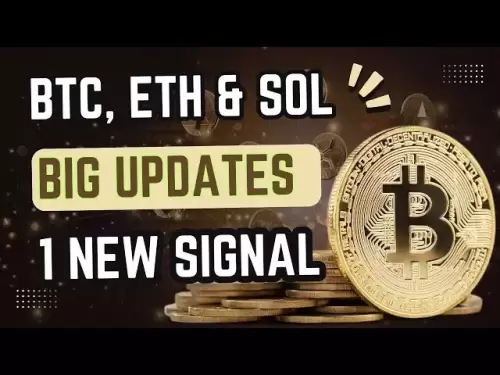-
 Bitcoin
Bitcoin $103,404.9301
-0.55% -
 Ethereum
Ethereum $2,483.6864
-4.18% -
 Tether USDt
Tether USDt $1.0002
0.02% -
 XRP
XRP $2.3680
-2.37% -
 BNB
BNB $642.9538
-2.33% -
 Solana
Solana $167.7710
-3.07% -
 USDC
USDC $0.9998
-0.01% -
 Dogecoin
Dogecoin $0.2170
-4.29% -
 Cardano
Cardano $0.7580
-3.38% -
 TRON
TRON $0.2689
-2.94% -
 Sui
Sui $3.7846
-2.52% -
 Chainlink
Chainlink $15.4199
-5.63% -
 Avalanche
Avalanche $22.7950
-4.85% -
 Hyperliquid
Hyperliquid $27.0992
1.50% -
 Stellar
Stellar $0.2906
-2.15% -
 Shiba Inu
Shiba Inu $0.0...01431
-5.40% -
 UNUS SED LEO
UNUS SED LEO $8.9456
1.10% -
 Hedera
Hedera $0.1931
-3.61% -
 Bitcoin Cash
Bitcoin Cash $398.5940
-0.34% -
 Toncoin
Toncoin $3.0618
-1.54% -
 Litecoin
Litecoin $99.7231
-0.89% -
 Polkadot
Polkadot $4.6932
-3.68% -
 Monero
Monero $338.3317
-0.29% -
 Bitget Token
Bitget Token $4.9547
-1.37% -
 Dai
Dai $1.0000
0.01% -
 Pepe
Pepe $0.0...01239
-8.13% -
 Pi
Pi $0.6996
-18.51% -
 Ethena USDe
Ethena USDe $1.0008
0.05% -
 Uniswap
Uniswap $5.8967
-7.29% -
 Bittensor
Bittensor $416.3327
-5.32%
Does Ethereum Wallet support hardware wallet integration?
Many popular Ethereum wallets like MetaMask and MyEtherWallet seamlessly integrate with Ledger and Trezor hardware wallets, significantly enhancing security by storing private keys offline.
Mar 22, 2025 at 11:08 am
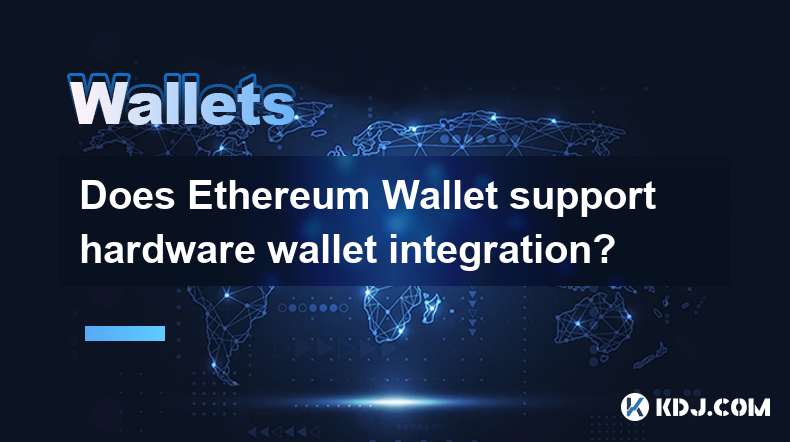
Does Ethereum Wallet Support Hardware Wallet Integration?
Ethereum, the second-largest cryptocurrency by market capitalization, offers users various ways to manage their ETH and ERC-20 tokens. Security is paramount in the cryptocurrency world, and hardware wallets are often considered the most secure option. But does every Ethereum wallet support hardware wallet integration? The answer is nuanced and depends on which Ethereum wallet you're using.
Many popular Ethereum wallets offer seamless integration with various hardware wallets. This integration enhances the security of your private keys by storing them offline on a dedicated device, shielding them from malware, phishing attacks, and other online threats. The process is generally straightforward, although specific steps vary depending on the wallet and hardware device used.
Let's examine the support offered by different types of Ethereum wallets:
Software Wallets:
Software wallets, downloaded and installed on your computer or mobile device, often support hardware wallet integration. Popular examples include MetaMask, MyEtherWallet (MEW), and Trust Wallet. The integration process usually involves connecting the hardware wallet to your computer and authorizing the connection within the software wallet interface.
- MetaMask: MetaMask explicitly supports Ledger and Trezor hardware wallets, allowing users to manage their Ethereum assets securely. The integration process is well-documented on both MetaMask's and the hardware wallet manufacturers' websites.
- MyEtherWallet (MEW): MEW also supports various hardware wallets, including Ledger and Trezor. This allows users to securely interact with their Ethereum accounts without exposing their private keys to their computer.
- Trust Wallet: Trust Wallet, a mobile wallet, offers support for Ledger and Trezor devices. This brings the added security of a hardware wallet to the convenience of a mobile interface.
The specific steps to integrate a hardware wallet with a software wallet vary slightly depending on the chosen software and hardware. Consult the official documentation of both your chosen software and hardware wallet for detailed instructions. Improper integration can compromise security, so accurate adherence to these instructions is crucial.
Exchange Wallets:
Exchange wallets, offered by cryptocurrency exchanges like Coinbase or Binance, generally do not support direct hardware wallet integration. Your cryptocurrency is stored on the exchange's servers. While some exchanges offer advanced security features, they are not directly comparable to the level of security provided by a hardware wallet. The inherent risk with exchange wallets lies in the centralized nature of the exchange; a security breach could compromise all assets held on that platform.
Paper Wallets:
Paper wallets, which involve printing your private keys and public addresses on paper, are a less convenient but still secure method of storing Ethereum. They do not require hardware wallet integration as the private keys are stored offline. However, they are vulnerable to physical damage or theft.
Hardware Wallet Compatibility:
The most common and widely supported hardware wallets for Ethereum are Ledger and Trezor devices. Both offer robust security features and are compatible with a wide range of software wallets and Ethereum-based decentralized applications (dApps). Other hardware wallets may exist, but compatibility should always be verified before purchase and use.
Choosing the right hardware wallet requires careful consideration of your needs and technical proficiency. Both Ledger and Trezor offer user-friendly interfaces, but the specific features and price points differ. Research is essential to ensure you select a device that meets your security requirements. Furthermore, always buy directly from the manufacturer to avoid counterfeit devices.
Frequently Asked Questions:
Q: Is using a hardware wallet mandatory for Ethereum?
A: No, it is not mandatory. However, using a hardware wallet significantly enhances the security of your Ethereum holdings, making it a highly recommended practice, especially for larger amounts of ETH or valuable ERC-20 tokens.
Q: Can I use a single hardware wallet for multiple cryptocurrencies?
A: Yes, many hardware wallets support multiple cryptocurrencies, including Ethereum and other tokens. Check the specifications of your chosen hardware wallet to confirm supported coins and tokens.
Q: What happens if I lose my hardware wallet?
A: Losing your hardware wallet can result in the loss of access to your Ethereum. The recovery process depends on the specific device and whether you have a recovery seed phrase. Always store your seed phrase securely and separately from your hardware wallet.
Q: Are hardware wallets completely immune to hacking?
A: While hardware wallets offer a high level of security, they are not entirely immune to hacking. Physical theft or sophisticated attacks remain potential threats. Practicing good security hygiene, such as using strong passwords and keeping your firmware updated, remains crucial.
Q: What is the cost of a hardware wallet?
A: Hardware wallets typically range in price from $50 to $200, depending on the brand and features. The cost is a worthwhile investment to protect your cryptocurrency assets.
Q: Are there any free hardware wallets?
A: No, reputable hardware wallets are not free. Free alternatives often compromise security, putting your funds at risk.
Disclaimer:info@kdj.com
The information provided is not trading advice. kdj.com does not assume any responsibility for any investments made based on the information provided in this article. Cryptocurrencies are highly volatile and it is highly recommended that you invest with caution after thorough research!
If you believe that the content used on this website infringes your copyright, please contact us immediately (info@kdj.com) and we will delete it promptly.
- "How much will you exchange Tether (USDT) for cash...?"
- 2025-05-17 13:30:13
- Shaquille O’Neal Has Agreed to Settle $11M with Investors
- 2025-05-17 13:30:13
- Philly Fed's April Manufacturing Business Outlook Survey Jolts Global Risk Markets and Gives Crypto Assets Their
- 2025-05-17 13:25:13
- XRP price dips 3% to $2.41 as a US District Judge Analisa Torres overrule Ripple $125M settlement fine against Ripple.
- 2025-05-17 13:25:13
- Solv, Avalanche, and a Consortium of DeFi Protocols Have Launched SolvBTC.AVAX
- 2025-05-17 13:20:18
- XRP Could Be Incorporated into US National Reserves Before the End of 2025
- 2025-05-17 13:20:18
Related knowledge
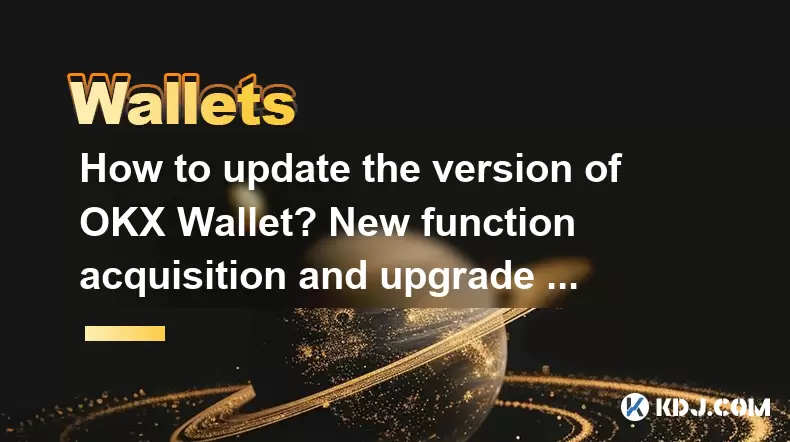
How to update the version of OKX Wallet? New function acquisition and upgrade guide
May 17,2025 at 11:00am
Introduction to OKX Wallet UpdatesUpdating the OKX Wallet is essential for users who want to stay current with the latest features and security enhancements. OKX Wallet regularly releases updates to improve user experience, add new functionalities, and ensure the safety of your assets. This guide will walk you through the process of updating your OKX Wa...
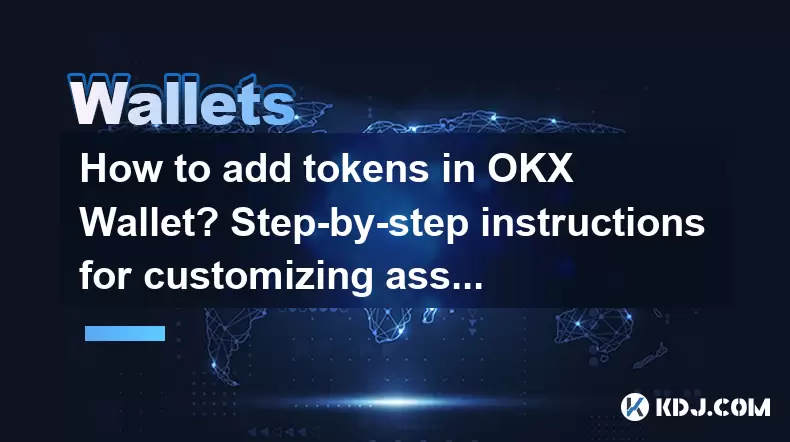
How to add tokens in OKX Wallet? Step-by-step instructions for customizing asset display
May 17,2025 at 02:14am
Adding tokens to your OKX Wallet and customizing the asset display can enhance your overall user experience by allowing you to manage and view your preferred cryptocurrencies more efficiently. This guide will walk you through the detailed steps to add tokens and customize the asset display on the OKX Wallet. Accessing the OKX WalletBefore you can add to...
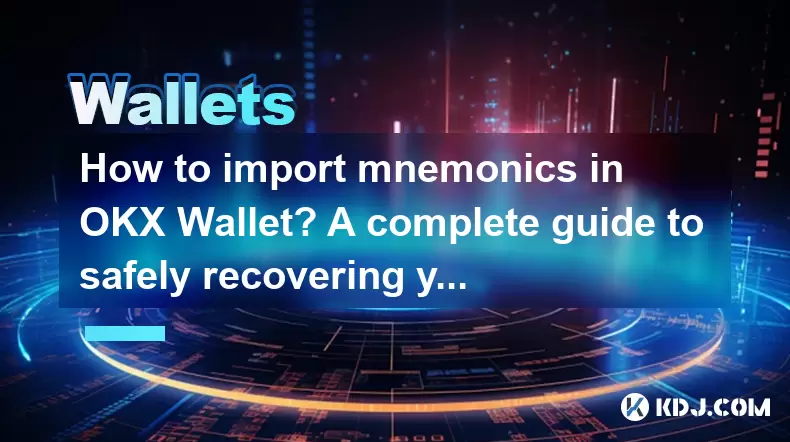
How to import mnemonics in OKX Wallet? A complete guide to safely recovering your account
May 17,2025 at 04:35am
Importing mnemonics into the OKX Wallet is a crucial process for users who need to recover their accounts or transfer their assets to a new device. This guide will walk you through the steps to safely import your mnemonics, ensuring that your account and assets remain secure throughout the process. Understanding Mnemonics and Their ImportanceMnemonics, ...
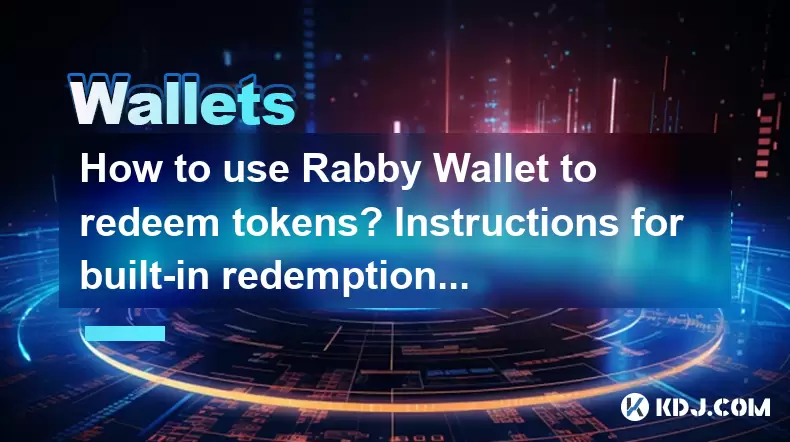
How to use Rabby Wallet to redeem tokens? Instructions for built-in redemption function
May 17,2025 at 07:29am
Rabby Wallet is a versatile tool for managing your cryptocurrencies, and one of its handy features is the built-in token redemption function. This guide will walk you through the process of using Rabby Wallet to redeem tokens, ensuring you understand every step involved. Understanding Token RedemptionBefore diving into the redemption process, it's impor...
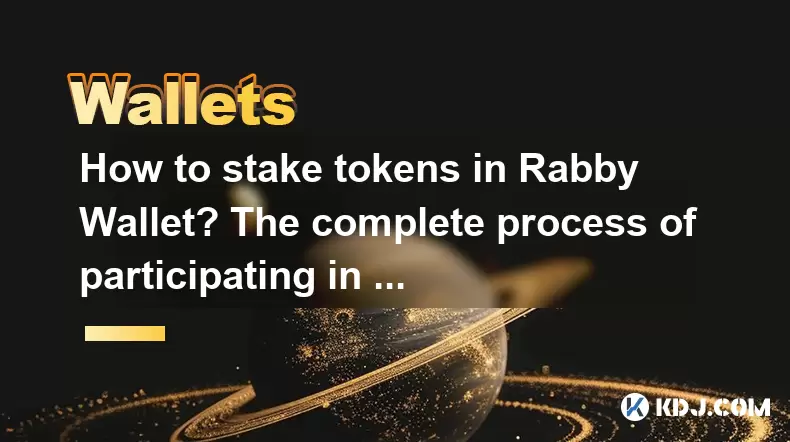
How to stake tokens in Rabby Wallet? The complete process of participating in staking mining
May 17,2025 at 07:21am
Staking tokens in Rabby Wallet to participate in staking mining is an exciting opportunity for cryptocurrency enthusiasts to earn rewards while supporting the networks they believe in. This guide will walk you through the complete process, from setting up your Rabby Wallet to successfully staking your tokens and managing your staking rewards. Setting Up...
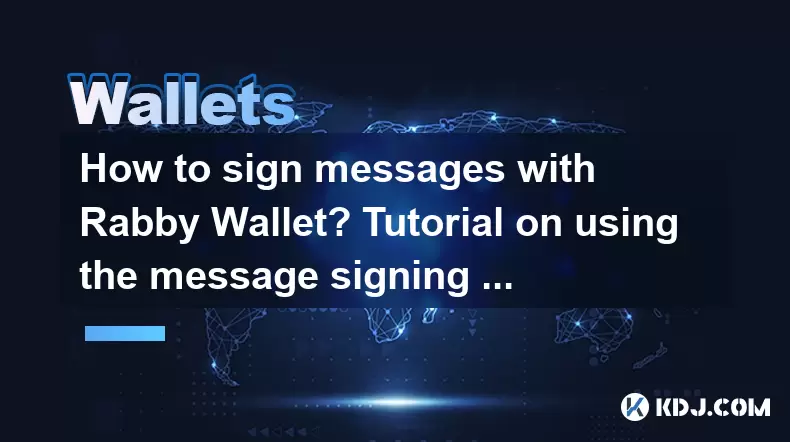
How to sign messages with Rabby Wallet? Tutorial on using the message signing function
May 17,2025 at 12:57pm
Rabby Wallet is a versatile tool for managing cryptocurrencies, and one of its key features is the ability to sign messages. This function is crucial for verifying ownership of a wallet address and ensuring the authenticity of communications. In this tutorial, we will walk you through the process of signing messages with Rabby Wallet, covering every ste...

How to update the version of OKX Wallet? New function acquisition and upgrade guide
May 17,2025 at 11:00am
Introduction to OKX Wallet UpdatesUpdating the OKX Wallet is essential for users who want to stay current with the latest features and security enhancements. OKX Wallet regularly releases updates to improve user experience, add new functionalities, and ensure the safety of your assets. This guide will walk you through the process of updating your OKX Wa...

How to add tokens in OKX Wallet? Step-by-step instructions for customizing asset display
May 17,2025 at 02:14am
Adding tokens to your OKX Wallet and customizing the asset display can enhance your overall user experience by allowing you to manage and view your preferred cryptocurrencies more efficiently. This guide will walk you through the detailed steps to add tokens and customize the asset display on the OKX Wallet. Accessing the OKX WalletBefore you can add to...

How to import mnemonics in OKX Wallet? A complete guide to safely recovering your account
May 17,2025 at 04:35am
Importing mnemonics into the OKX Wallet is a crucial process for users who need to recover their accounts or transfer their assets to a new device. This guide will walk you through the steps to safely import your mnemonics, ensuring that your account and assets remain secure throughout the process. Understanding Mnemonics and Their ImportanceMnemonics, ...

How to use Rabby Wallet to redeem tokens? Instructions for built-in redemption function
May 17,2025 at 07:29am
Rabby Wallet is a versatile tool for managing your cryptocurrencies, and one of its handy features is the built-in token redemption function. This guide will walk you through the process of using Rabby Wallet to redeem tokens, ensuring you understand every step involved. Understanding Token RedemptionBefore diving into the redemption process, it's impor...

How to stake tokens in Rabby Wallet? The complete process of participating in staking mining
May 17,2025 at 07:21am
Staking tokens in Rabby Wallet to participate in staking mining is an exciting opportunity for cryptocurrency enthusiasts to earn rewards while supporting the networks they believe in. This guide will walk you through the complete process, from setting up your Rabby Wallet to successfully staking your tokens and managing your staking rewards. Setting Up...

How to sign messages with Rabby Wallet? Tutorial on using the message signing function
May 17,2025 at 12:57pm
Rabby Wallet is a versatile tool for managing cryptocurrencies, and one of its key features is the ability to sign messages. This function is crucial for verifying ownership of a wallet address and ensuring the authenticity of communications. In this tutorial, we will walk you through the process of signing messages with Rabby Wallet, covering every ste...
See all articles
























